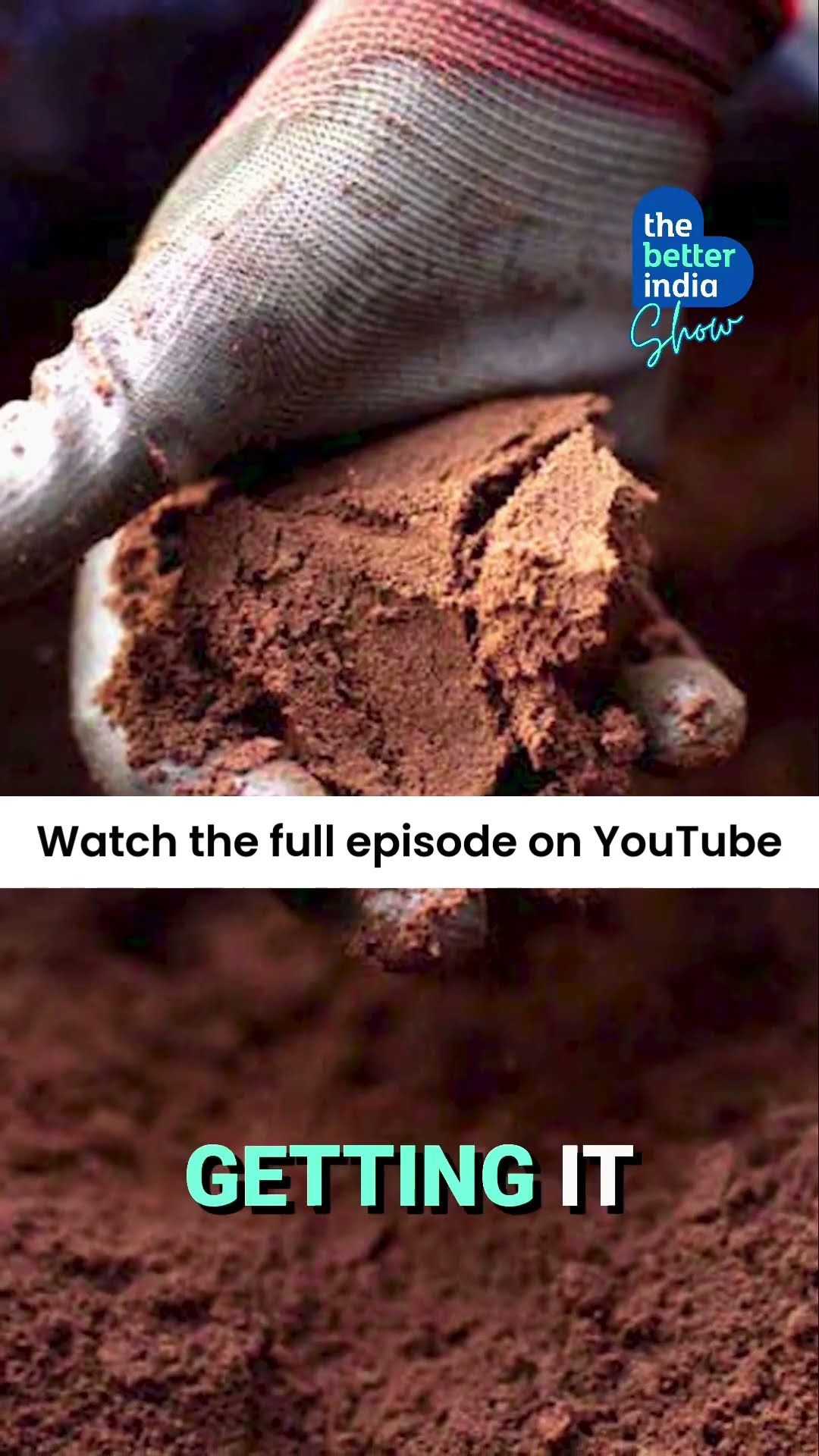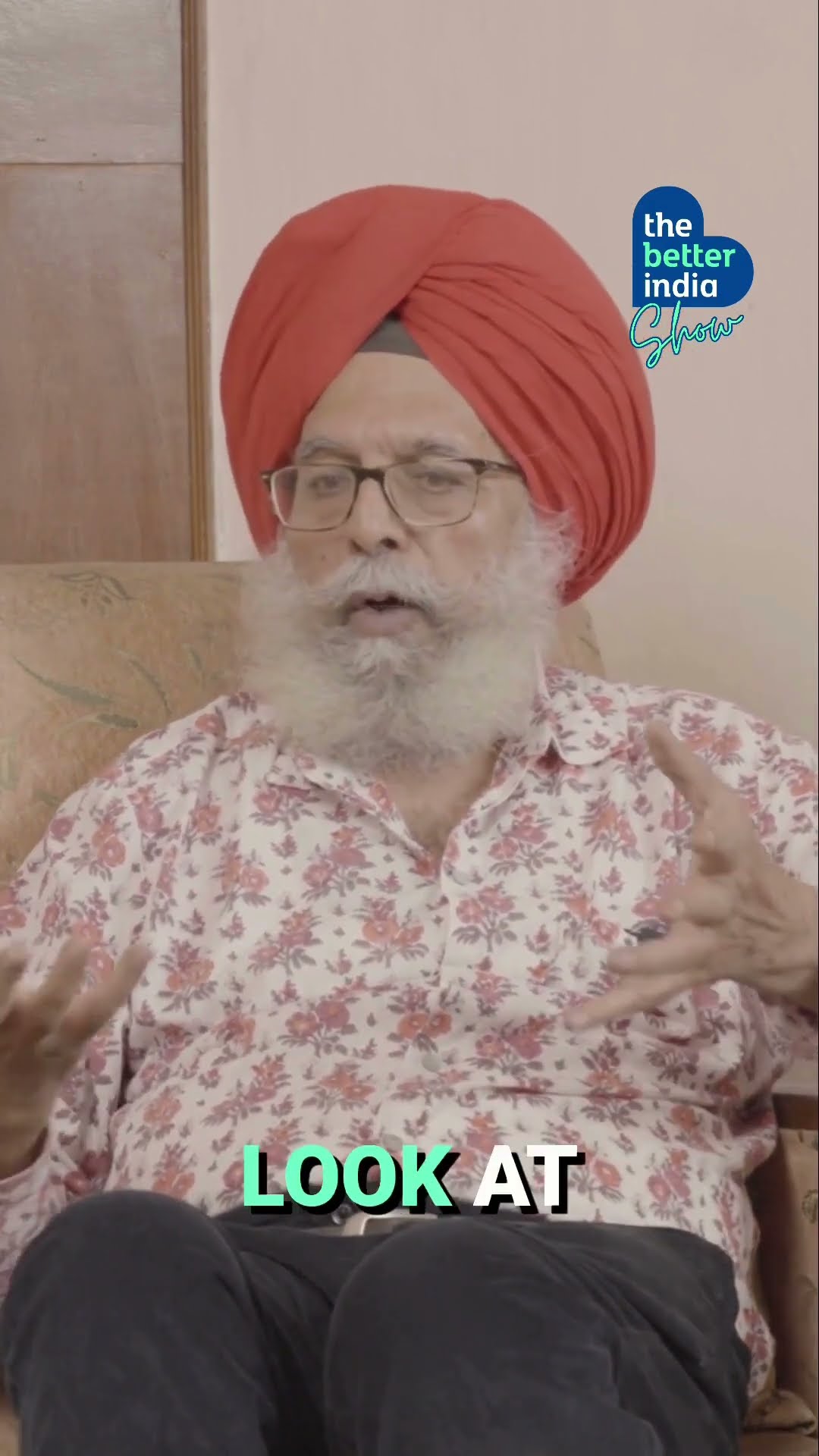3 College Friends Take Uttarakhand’s Traditional ‘Pahadi’ Salt To The World, Earn Rs 1.5 Cr
Sandeep Pandey’s dreams of opening a restaurant were shattered by the 2013 Uttarakhand floods. Later, with his childhood friends Sourabh Pant and Yogendra Singh, he founded HimFla, a startup selling Uttarakhand's traditional ‘pahadi’ salt.
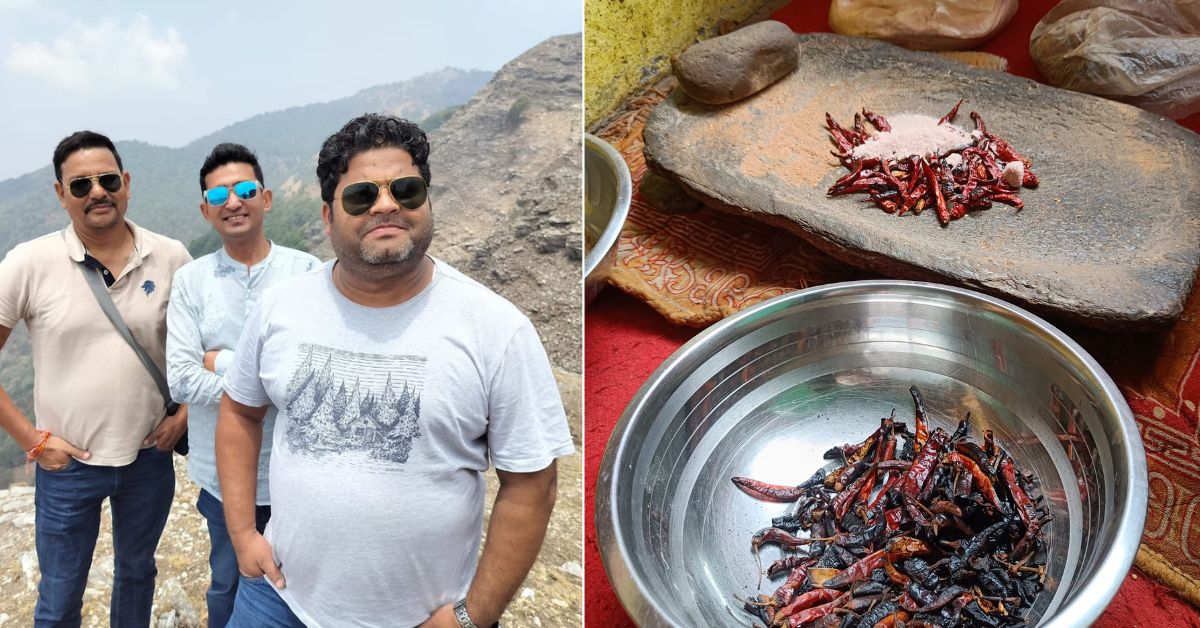
After all the hard work, Uttarakhand-based Sandeep Pandey was delighted that his eatery would finally be inaugurated soon. But fate had other plans. “Unfortunately, my eatery was ravaged by floods in the 2013 natural disaster. The road was blocked for six months. Everything was reduced to ruins and my restaurant was shut a week before the opening,” he recalls.
Sandeep was devastated.
In 2009, he had quit his engineering career in Delhi to move back to his quaint hometown of Nainital and run a restaurant. Now, he was left without any plan.
Three months after the floods, as he was passing through a field, he noticed a few women labourers eating roti (flatbread) with onions and pisyun loon — pahadi salt hand grounded on silbatta (traditional grinding stone).
“They offered me the chapati and salt made with garlic and green chillies. It was extremely tasty. I also ate kakdi (Armenian cucumber) with this salt. Then, I realised it is this salt that makes pahadi food so flavoursome. I recalled how my mother would pack this salt whenever I went out of town for work,” he says, adding that he realised no one had thought of commercialising this salt so far.
While relishing the meal, Sandeep also got a glimpse into the harsh lives of hill women. “These women were working under the MGNREGA scheme as labourers and their job was to dig ground and lift boulders — all for a daily wage of Rs 270. The work was said to guarantee 100 days of employment in a year but the system was corrupt at the village level. There was no surety on timely payments and number of working days,” he adds.
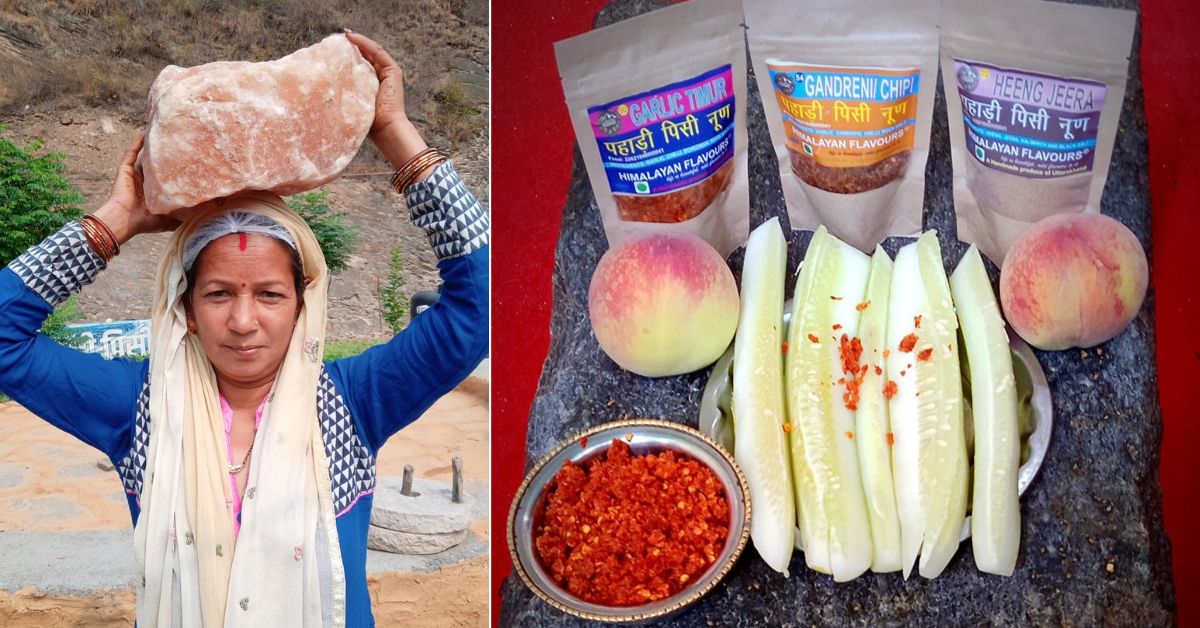
Sandeep now knew what needed to be done.
In August 2013, he decided to commercialise the flavoured salt and provide employment to rural women. Along with his childhood friends Sourabh Pant and Yogendra Singh, he launched HimFla – short for Himalayan Flavours.
The inception of a multi-crore business with just Rs 160
Talking about the uniqueness of the flavoured salt, Sandeep says, “These days, kitchens are mostly modular; traditional silbattas have been replaced by grinders and mixers. Although electronic machines have made our lives easier, the taste achieved through grinding in silbattas can’t be got through modern equipment.”
“On a silbatta, the salt is pounded without any heat. This keeps the natural taste and flavours intact. In a grinder, the food is just cut into very fine pieces and not pounded to be properly mixed. When you use a silbatta, you’re actually blending all the oils of the herbs and spices together to enhance the flavours,” he adds.
Sandeep was determined to revive the traditional practice of using silbattas. With an initial investment of Rs 160, he bought the grinding stone, a handful of fresh coriander, and green chillies, and kicked off the business.
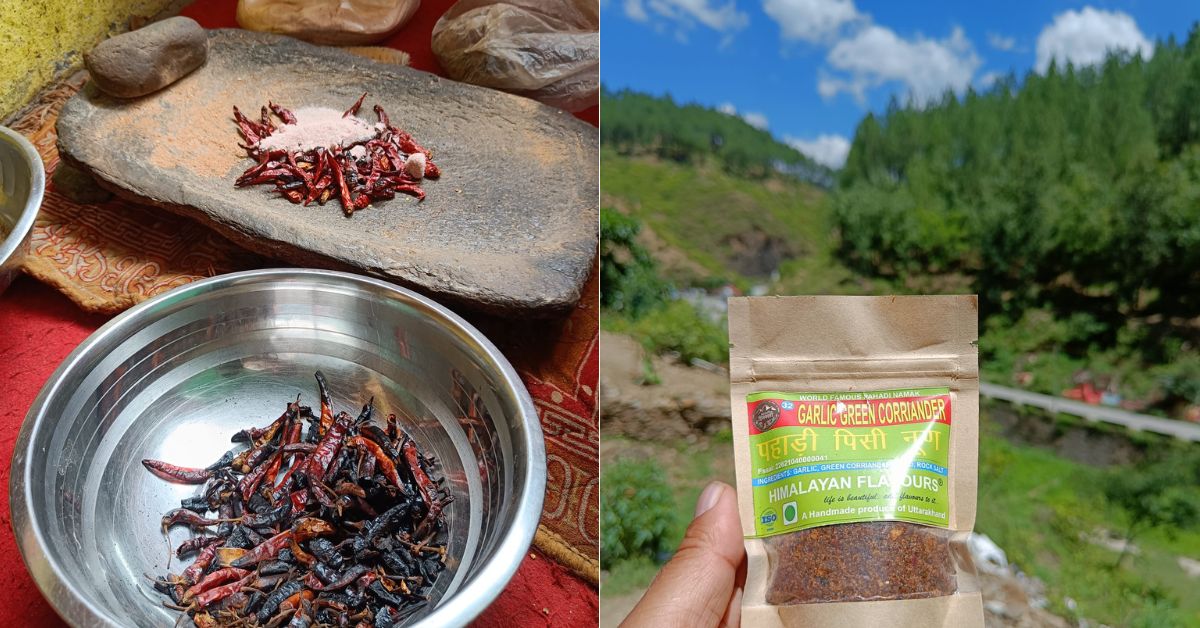
To market the products, Sandeep and his friends set up a stall at a local fair. “Our products were so loved that we were out of stock on the third day. We got a great response from both locals as well as tourists. Later in Haldwani, we set up a stall and made sales of Rs 1.5 to 2 lakh in seven days. Our work was featured in local news, and with that, we earned fame and started getting more and more orders,” he informs.
Since then, there has been no looking back for Sandeep.
Every month, HimFla manufactures up to 20 quintals of flavoured salt to cater to their customers in India and worldwide — including Australia, the US, the UK, Dubai, Germany, Singapore, and Brazil. Today, the startup’s annual revenue stands at Rs 1.5 crore.
Employing rural households with dignity
Starting with five flavours — garlic green chilli, garlic red chilli, garlic yellow chilli, hemp, and mint — today HimFla has 52 flavours. These include timur (Szechuan pepper harvested from the higher Himalayan regions of Uttarakhand) and hemp, which is a rich source of omega, Gandreni kala jeera (black cumin), and many more.
The startup sources pink rock salt from Pakistan and the rest of the spices and herbs from 1,000 small farmers from 100 villages across Nainital, Bageshwar, Chamoli, and Almora. With this work, he has been able to financially empower 80 rural women who have dropped shovels to grind spices and herbs on silbatta.
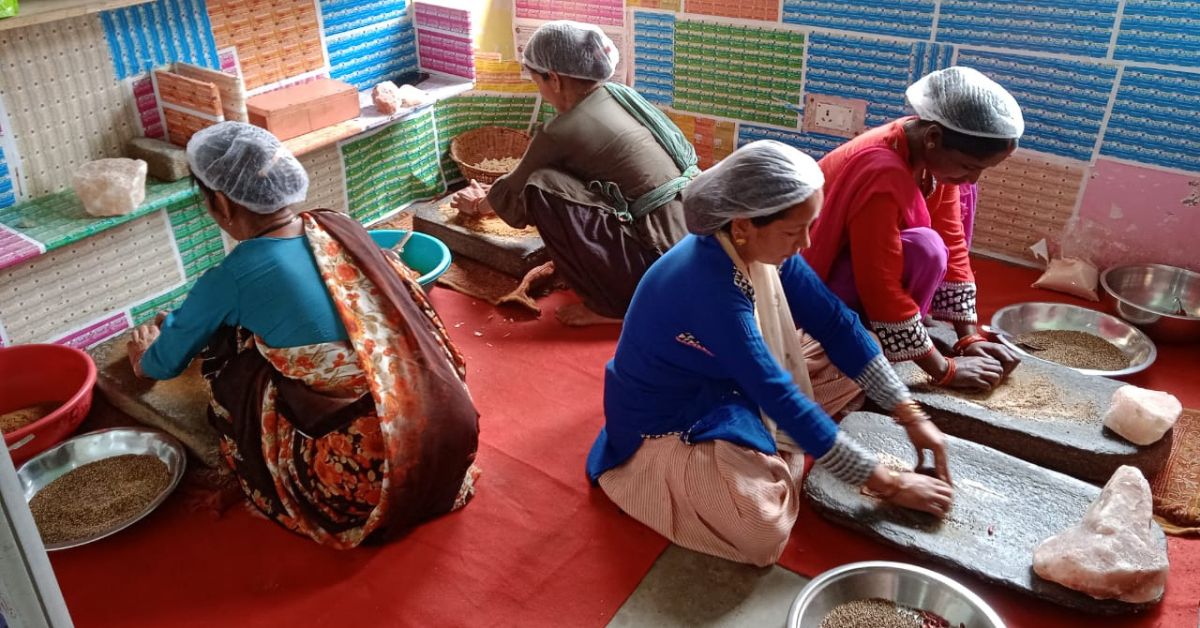
One of the workers Deepa Devi, who has been associated with HimFla for the past five years, tells The Better India, “I was dependent on farming and labour jobs but there were no fixed employment days. Some days, I would get jobs for two to four days in a month, and sometimes no days at all. It was difficult to manage household expenses.”
“Today, I am able to improve our household condition and have a roof over our heads. I was able to make a pucca house for my family. I remember my mother and dadi (grandmother) would make this salt and I would relish it with roti. They taught me the procedure as well but I had never imagined this would become a source of livelihood to me later,” says the 36-year-old, who now earns up to Rs 10,000 per month.
Selling the flavoured salt has changed not only the lives of these rural women but also Sandeep, who was once thrown out of his home for bringing disgrace to the family.
“My father was in the Army. When I told my family that I intended to sell salt, they were disappointed in me. My relatives mocked us and asked me to do better jobs. For Army persons, dignity is very prestigious and no one found dignity in the idea of selling salts. My family thought that I was heading in the wrong direction and that I was possessed by some hill ghost!” he laughs.
“They believed me only after six months when my work was featured in the news. Meanwhile, my friends, who are in the US, are buying luxurious cars. Often, they asked me to join them and earn handsome salaries. But here, when I see happy families getting financial independence through our work, it motivates me to work further. No other achievement could give us the contentment we experience through this work. Every night, I sleep well knowing 80 families are sleeping peacefully too,” he adds.
Edited by Pranita Bhat; All photos: HimFla.
If you found our stories insightful, informative, or even just enjoyable, we invite you to consider making a voluntary payment to support the work we do at The Better India. Your contribution helps us continue producing quality content that educates, inspires, and drives positive change.
Choose one of the payment options below for your contribution-
By paying for the stories you value, you directly contribute to sustaining our efforts focused on making a difference in the world. Together, let's ensure that impactful stories continue to be told and shared, enriching lives and communities alike.
Thank you for your support. Here are some frequently asked questions you might find helpful to know why you are contributing?






